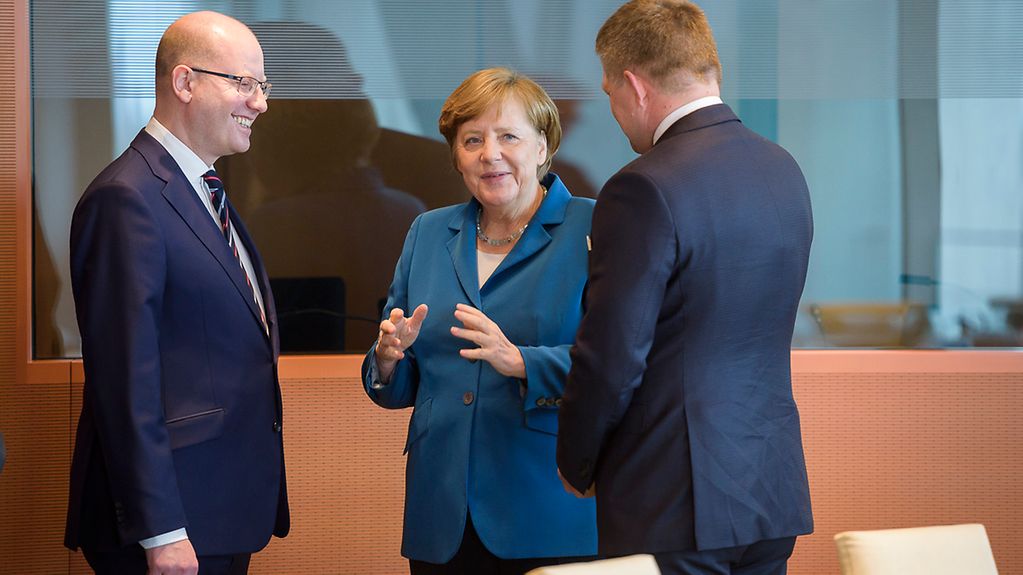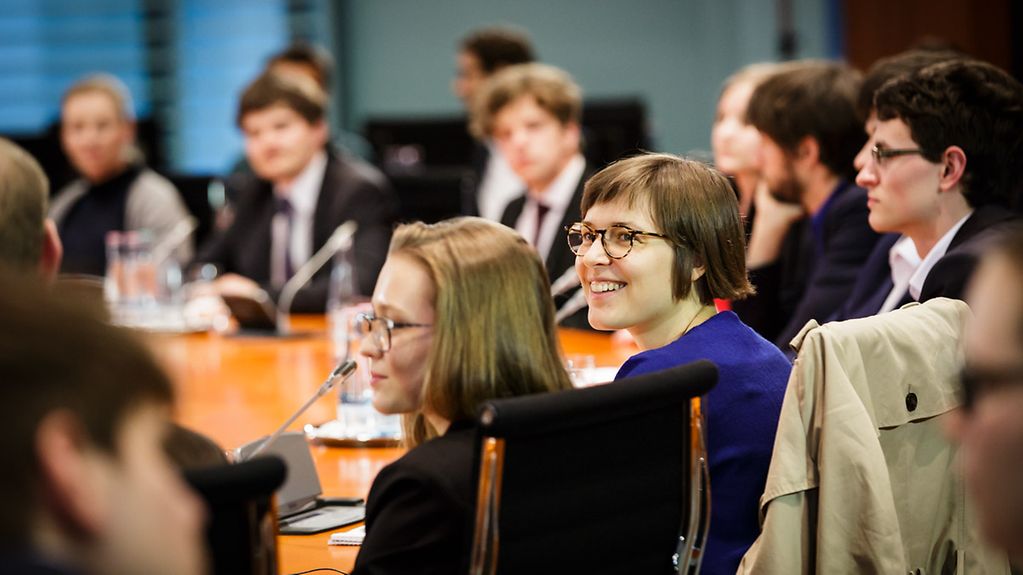25th anniversary of Treaty on Good Neighbourliness
25 years of good neighbourly relations with Czechs and Slovaks – to mark this anniversary, Chancellor Angela Merkel met with her opposite numbers Robert Fico and Bohuslav Sobotka to discuss regional and European issues.
5 min reading time

A reason to celebrate: the 25th anniversary of the Treaty on Good Neighbourliness between the Germans, Czechs and Slovaks
Photo: Bundesregierung/Kugler
After their meeting, the politicians came together with a group of young people to discuss their views of Europe.
Chancellor Angela Merkel spoke of a joyful occasion that these three parties could celebrate in Berlin: the 25th anniversary of the Treaty on Good Neighbourliness and Friendly Cooperation that the reunified Germany signed with what was then Czechoslovakia (the Czech and Slovak Federal Republic) in 1992. The Prime Ministers of the two successor states, Robert Fico for Slovakia and Bohuslav Sobotka for the Czech Republic, fully agreed with her.
1 January 1993 marked the peaceful dissolution of Czechoslovakia and the establishment of the Czech Republic and the Slovak Republic as individual sovereign states. Czechoslovakia itself had declared its independence from the Austro-Hungarian Empire on 28 October 1918. The state existed until it was divided by National Socialist Germany in March 1939. After the Second World War, Czechoslovakia was re-established as a socialist republic.
Close cooperation network
It was a "very harmonious meeting" summed up Angela Merkel. "Relations between the Czech Republic, the Slovak Republic and the Federal Republic of Germany are very good." Relations with the Czech Republic are cordial and neighbourly, and a close cooperation and exchange is in place that is underpinned by the issue of a strategic dialogue, underscored the Chancellor. In this context she pointed to the Future Fund and the German-Czech Declaration signed twenty years ago. This laid "important foundations" for today’s German-Czech partnership, she said.
Trilateral cooperation could be further consolidated in Angela Merkel’s opinion. With a view to the ministries of economic affairs and research, business associations and research facilities cooperation is to be stepped up. "All three countries share the desire to become more competitive, and to improve the economic situation and the situation of research in our countries," she reported.
Commitment to the future of the European Union
Looking ahead to the future of the European Union, the Chancellor thanked Slovakia’s EU Presidency during the second half of 2016. Prime Minister Robert Fico, she said, "led the EU with a sound hand through a phase that was anything but easy". The Bratislava Agenda set the scene for the future cooperation of the EU-27 "and was effectively an important pillar for the Rome Declaration," said Angela Merkel.
It could even be said that the EU has since achieved tangible results in some areas, including defence, she reported. "We haven’t left it at a declaration of intent; we have adopted concrete resolutions to establish a command centre, a sort of headquarters that is to assume command of European missions," explained Angela Merkel.
All three agreed, she reported, that the EU’s united stance in Rome at the summit to mark the 60th anniversary of the signing of the Treaties of Rome was "a very, very important step", because the EU is going to have to conduct Brexit negotiations with the United Kingdom parallel to its other activities. Under both Slovakia’s and Malta’s Presidency, the EU-27 has made it abundantly clear that it will act in concert on the negotiations.
"The departure of the United Kingdom is a watershed for the European Union. It is a disappointing thing to happen," noted the Chancellor. It will, of course, have a negative impact, but the Union is determined to limit the damage caused. This makes it all the more important that the 27 member states pull together "for the enhanced competitiveness, the future viability, and the openness of the European Union".
For cohesion and development
Both Angela Merkel and her two visitors pointed to the strong industrial heart of their three states, in particular with respect to the automobile industry. The Czech Republic and Slovakia have developed strongly over recent years, although they still have a lot of ground to make up in comparison to other EU states. "This is why we must seek ways of accelerating this cohesion as far as possible."
On behalf of his government, the Slovakian Prime Minister declared that he will be seeking to align living standards by 2020. All resources and funds will need to be used to this end, he added. And the planned meetings of ministers of economic affairs and research of the three countries will be helpful.
The Chancellor pointed to the close civil society relations that link the three states, as expressed not least in youth exchanges. "All in all our discussion today has had little to do with the past; we have focused on the future."
Discussion with young people about Europe
Following their talks, the three heads of government met with school pupils and students from Germany, the Czech Republic and Slovakia to discuss "Central Europe’s contribution to the future of Europe". Discussions focused on the opportunities the EU offers and the reforms needed. They also looked at what links the three countries and at what they expect from the Union.

Discussion with school pupils and students
Photo: Bundesregierung/Steins
The young adults had the opportunity to present their own views of different aspects of European policy in the form of short opening statements, and to put questions to the three leaders. One issue they brought up was the two-speed Europe.
Angela Merkel stressed that the EU does not intend to spend the next few years dealing exclusively with the departure of the United Kingdom. "We aim to prioritise the cohesion and the future of the 27 member states." It is easier to work together for climate action, human rights, freedom of the press and freedom of opinion than if every individual country were to go it alone.
Chancellor Angela Merkel described the cultural diversity of Europe as an enrichment. We should not attempt to homogenise everything, she said. "Europe’s diversity gives it something special, and that makes us strong because we also have a lot that we share," said Angela Merkel.